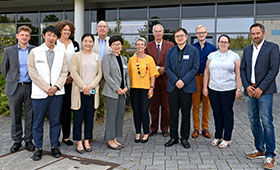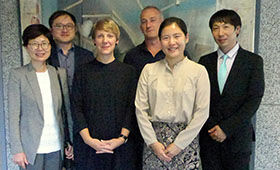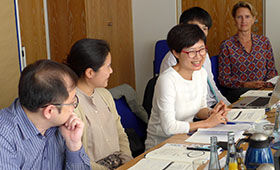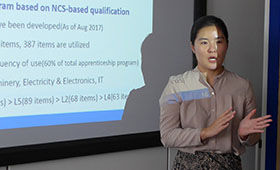Approaches towards higher dual vocational education and training in Germany and South Korea
South Korean researchers have recently been at BIBB and at the Koblenz University of Applied Sciences to exchange information on current developments in dual higher education study in Germany and on new approaches being adopted towards higher vocational education and training in South Korea.
On 28 and 29 August 2018, researchers from the Korea Research Institutes for Vocational Education and Training (KRIVET) visited both the Federal Institute for Vocational Education and Training (BIBB) and Koblenz University of Applied Sciences in order to network on the latest developments, opportunities and challenges emerging within the tertiary sector in Germany and South Korea and to gain insights into practice.
Dual higher education courses showing an upwards trend in Germany
Experts from BIBB familiarised their guests with the current forms and developments of dual higher education courses in Germany. This type of programme combines academic study with types of company-based training within the scope of vocational education and training or with practical phases spent at a company.
In overall terms, dual programmes of higher education study have undergone considerable growth in Germany over the past few years. As evaluations from BIBB’s “Training Plus” database reveal, the number of dual programmes more than tripled between 2004 and 2017. By 2017, just under 1,600 such courses were available. Two thirds of these were provided by universities of applied sciences as first academic degrees.
The specialist presentations and discussions illustrated that, in contrast to programmes that are purely academically aligned, provision of dual courses of study in Germany is more closely determined by requirements on the part of the companies. This particularly applies in respect of courses of study that combine initial vocational education and training with a higher education qualification. In South Korea, dual VET provision in the secondary and higher education sector has thus far been developed and funded by the state.
The diverse benefits of dual study programmes from the point of view of companies and institutes of higher education
On the following day, the South Korean delegation visited the Koblenz University of Applied Sciences, which is currently cooperating with companies in the Rhineland Palatinate region to offer twelve dual bachelor programmes of study. These are currently providing training prospects for 781 students.
Vice-Dean Professor Helmut Bollenbacher used the example of training-integrated bachelor programmes in the specialism of engineering to explain to his guests how study contents interlinked with company-based training in organisational and structural terms. Students are able to complete a dual course of higher education study over a period of just under five years. If they are successful, they are awarded both a vocational and an academic qualification.
A meeting took place with representatives from the umbrella organisation of the institutes of higher education in the Rhineland Palatinate which offer dual courses. These discussions, which also involved the Koblenz Chamber of Commerce and Industry and the company Stabilus, made it clear that dual courses of higher education study are becoming increasingly attractive for companies. Whereas small and medium-sized enterprises in particular are familiar with the concept of company-based training, school leavers are according greater significance to the acquisition of an academic qualification. Dual higher education provision enables companies to offer long-term prospects to budding skilled workers and to open up opportunities for advancement. For this reason, the study programmes are enjoying a high degree of popularity amongst applicants. Because a dual course of higher education study places considerable demands on students both in terms of time and specialist content, companies are careful when making their selection. “To be accepted onto a programme leading to the qualification of Bachelor of Engineering, candidates need to achieve mathematics and physics marks of more than 10 points (top third) in their upper secondary school leaving certificate,” emphasised the representative from Stabilus.
In the joint discussion that followed, Professor Daniela Braun, Vice President of the Koblenz University of Applied Sciences, stressed that the success of dual programme of study concepts was crucially dependent on quality. She pointed out that there is a particular requirement for the academic and company-based contents of a dual course to be related to each other in a useful way, and time structures also need to be appropriate. The objective was to align academic and practical occupational contents to company stipulations whilst also ensuring that students are able to cope with the workload involved.
South Korea – facilitating higher professional training and strengthening practical relevance in the higher education sector
Various pilot initiatives have been launched in South Korea in recent years to link elements of dual VET with educational provision in the post-secondary and higher education sectors. The aim is to enhance the attractiveness of the field of vocational education and training and to react to the rising skills requirements on the labour market. South Korea places particular emphasis on practice-related and needs-oriented training in order to alleviate the mismatch between those with academic qualifications and the needs of the companies.
The cooperation agreement between the Korea Research Institute for Vocational Education and Training (KRIVET) and BIBB has been in force since the year 2000. At the beginning of 2018, it was updated to focus on comparative research and specialist educational policy dialogue relating to current issues. South Korea views Germany as a role model because of its high quality vocational education and training system and strong SME sector.



